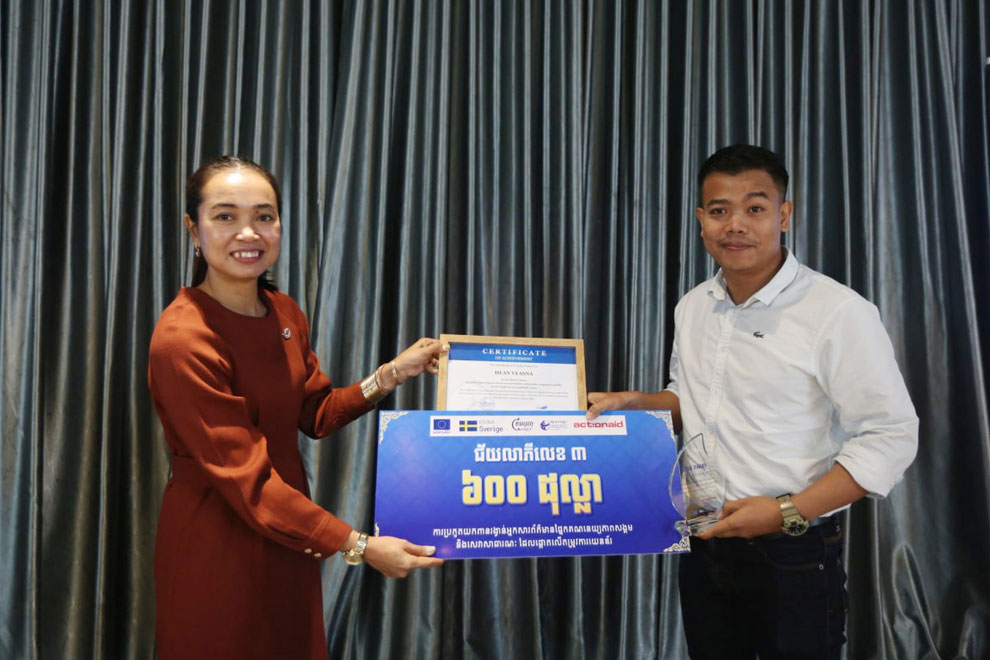
Freelance journalist Soth Ban was awarded first prize for an article titled “Dilapidated buildings and lack of study materials at Lao Romiet Primary School in Mondulkiri province”, which was published by VOD on November 13. CAMBOJA
Three journalists from different media outlets have won a competition for reporting on social accountability and public services, beating out many other contestants. The winners were awarded the prizes on November 23 by the Cambodian Journalists Alliance (CamboJA).
The themes the journalists were required to focus their entries on were "Empowering young women to make better decisions" and "accountable public service delivery".
Freelance journalist Soth Ban was awarded first prize for an article titled “Dilapidated buildings and lack of study materials at Lao Romiet Primary School in Mondulkiri province”, which was published by VOD on November 13.
The article detailed how the dropout of indigenous Bunong children has increased and become a problem due to the lack of study materials and proper school buildings.
When it rained, the students could not study because of the noise coming from it hitting the zinc roof. Not only that, some students had to travel over 20km on muddy roads and through thick forests.
“More and more students have dropped out of school because of these factors, and most importantly, parents do not see the importance of their children's education because literally they have only ever used the Bunong language,” Ban said.
The runner-up, Va Sopheanut, won second prize for an article about citizens in two communes of Kampong Thom province who do not have local health centres and the difficulties they faced taking roads in poor condition to seek health services elsewhere, published by CamboJA on November 18.

The runner-up, Va Sopheanut, won second prize for an article about citizens in two communes of Kampong Thom province who do not have local health centres and the difficulties they faced taking roads in poor condition to seek health services elsewhere, published by CamboJA on November 18. CAMBOJA
Sopheanut said the people in the two communes all travelled to the next closest commune to get health services, which caused further delays due to the fact that people from three communes were all forced to use the services of one location.
The distance required to travel there was a problem, but even more challenging than that was the poor condition of the roads.
“The people in the three communes are not very prosperous. They are mostly farmers and it is very difficult for pregnant women to get regular check-ups there or to give birth,” he added.
Second runner-up in the contest was Hean Veasna, a journalist from Chamkar Chek Radio and TV in Battambang province, who won for an article about indigenous people in Battambang facing the loss of their community land after having requested collective land registration for the past 10 years to no avail.

Second runner-up in the contest was Hean Veasna, a journalist from Chamkar Chek Radio and TV in Battambang province. CAMBOJA
Veasna said commune officials and a group of Por indigenous people were involved in the land dispute. The Por indigenous people had cleared 61ha of land to live on starting in 2001, and they have asked for collective land registration as an indigenous community. But the request has been “ignored” while the commune officials are demanding 40ha of the land.
“The road to the indigenous community is quiet. There are only remote plantations and fields still contaminated with landmines. Personally, I don't mind taking risks because what motivates me is sympathy. I wanted to raise the issue in order to find a suitable solution for both parties,” he said.
Nop Vy, executive director of CamboJA, said the contestants represent the new generation of journalists and they will be important resources for the future of journalism in Cambodia.
The contest was made possible with the support of the EU, the Swedish International Development Cooperation Agency (SIDA) and Action Aid.









